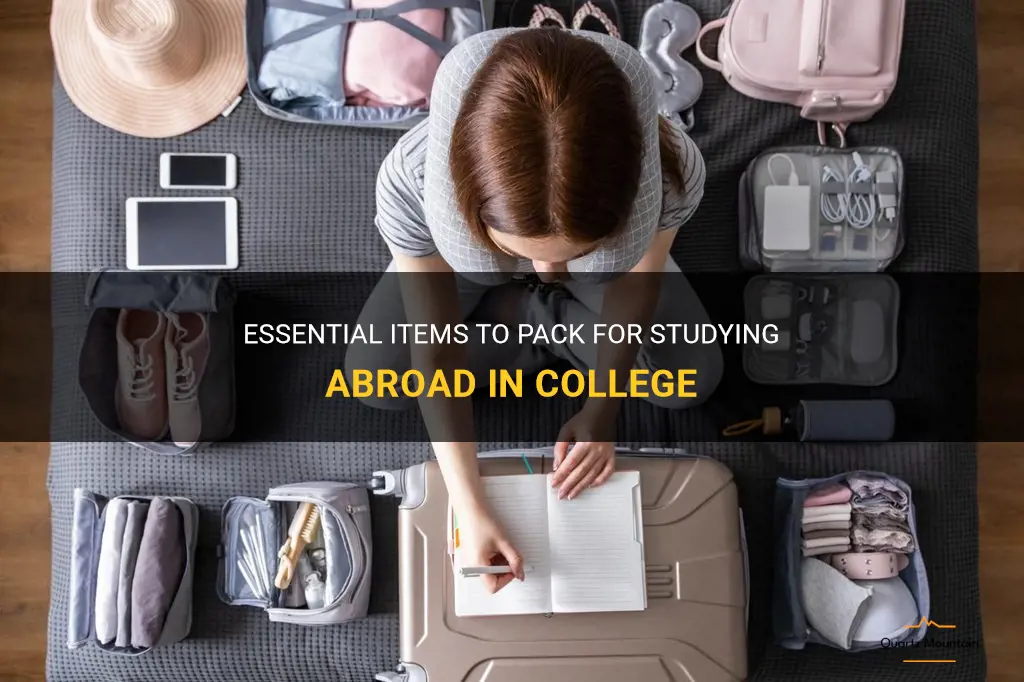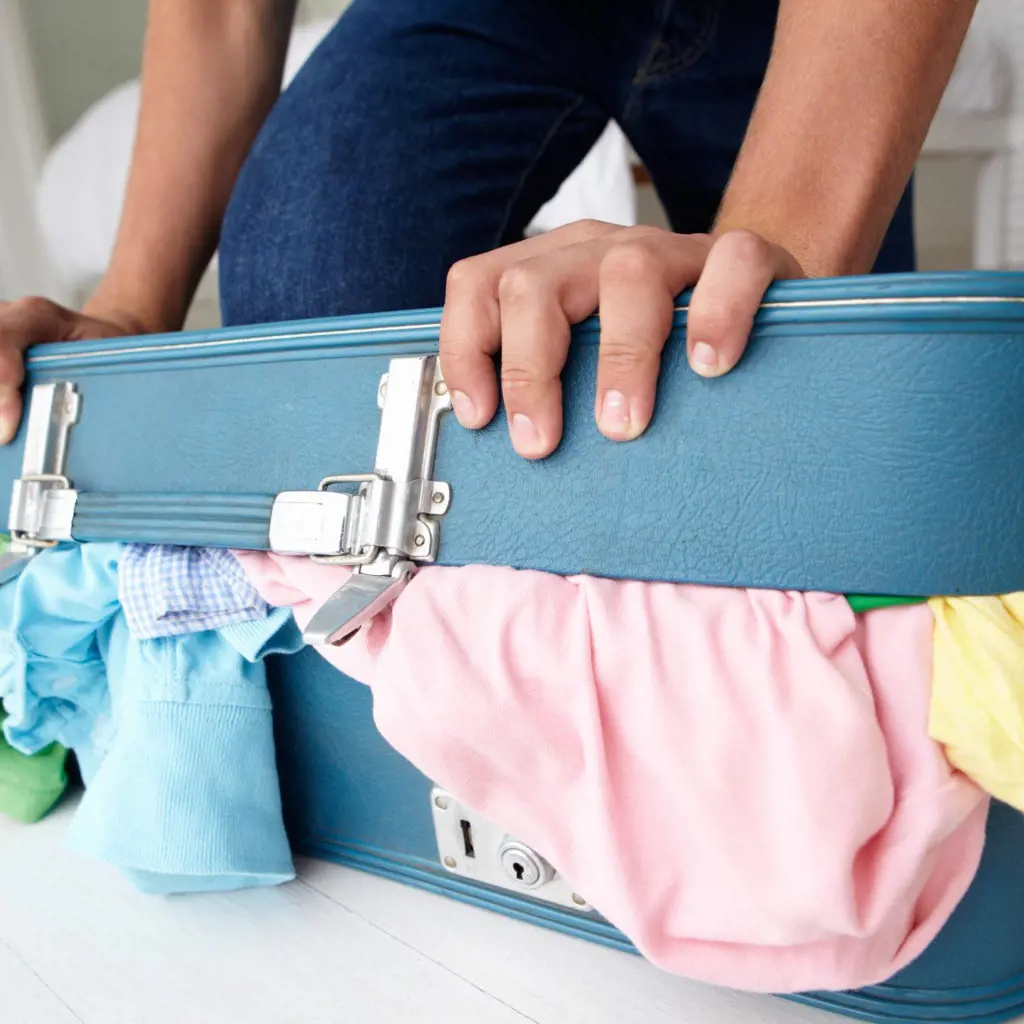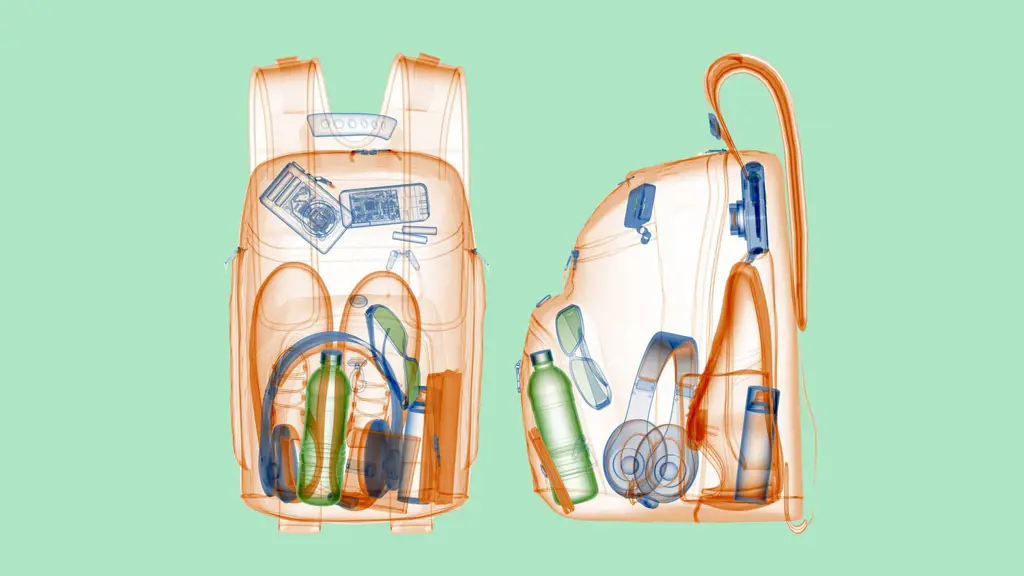
Studying abroad in college is an exciting opportunity to immerse yourself in a new culture, expand your horizons, and gain valuable life experiences. However, living in a foreign country can also present its own set of challenges, especially when it comes to packing the essentials. From practical items like travel adapters and universal chargers to cultural necessities like comfortable walking shoes and a reliable translation app, the right items can greatly enhance your experience and make your time abroad more enjoyable. In this article, we will explore the essential items you should pack when studying abroad in college, ensuring that you are prepared for any situation that may arise while you're away from home.
What You'll Learn
- What are the essential items to pack when going overseas for college?
- How do I determine what to pack based on the climate and cultural norms of the country I'm going to?
- Are there any specific documents or paperwork I need to bring when studying overseas?
- What are some tips for packing efficiently and fitting everything into a limited amount of luggage?
- Are there any restrictions or regulations for certain items when traveling internationally for college?

What are the essential items to pack when going overseas for college?

When you're heading overseas for college, there are a few essential items you don't want to forget to pack. Moving to a new country is exciting and can be a bit overwhelming, so it's important to be prepared and have everything you need to make your transition as smooth as possible. Here are some of the essential items to consider packing before you head overseas for college.
Travel Documents:
One of the most critical things to pack when going overseas for college is your travel documents. Make sure to have a valid passport with at least six months of validity left. Additionally, check if you need any visas or permits to study in the country you're going to. Keep all your travel documents in a secure and easily accessible place, like a passport holder or document organizer.
Clothing and Weather Essentials:
Research the climate of the country you're going to and pack accordingly. Make sure to pack enough clothes for different seasons and activities. Don't forget to pack comfortable walking shoes because you might have to explore your new surroundings on foot. If you're moving to a colder region, pack warm jackets, hats, gloves, and scarves. If you'll be living in a hot climate, pack lightweight and breathable clothing.
Electronics and Power Adapters:
Pack the essential electronic devices you'll need for your studies, such as a laptop, tablet, or smartphone. Consider the voltage and plug types used in your destination country and bring the necessary power adapters or transformers to ensure your electronics can be used safely.
Toiletries and Medications:
Pack toiletries that might be difficult to find or more expensive in your destination country. This can include items like your preferred toothpaste, shampoo, deodorant, or skincare products. Likewise, if you have any medications, make sure to bring an adequate supply along with the prescriptions or doctor's notes. Check with your destination country's regulations regarding the importation of medications and make sure you comply with any necessary documentation.
Bedding and Linens:
Consider packing sheets, pillowcases, and towels from home, especially if you're particular about the feel and quality. Bringing a familiar set of bedding and towels can make your new dorm or apartment feel a bit more like home.
Kitchen Essentials:
If you plan on cooking your meals or want to have some familiar cooking utensils, consider bringing some basic kitchen essentials. This may include items like a small-sized pot, pan, utensils, a knife, and perhaps a favorite spice or two. However, make sure to check your destination country's customs regulations regarding importing food items to avoid any issues at the border.
Personal Mementos and Comfort Items:
Lastly, bring some personal mementos or comfort items from home. These can be things like photographs, small decorations for your room, or items that hold sentimental value. These little touches can help make your new living space feel more like home and provide comfort during moments of homesickness.
Packing for an overseas college experience involves careful planning and consideration. Make a checklist and double-check that you have packed all the essential items well in advance of your departure. Remember to also leave some space in your luggage for items you may want to bring back home or things you might purchase in your new country. Being prepared and having everything you need will help you settle into your new college abroad with ease.
Essential Items to Include in Your Road Trip Packing Checklist
You may want to see also

How do I determine what to pack based on the climate and cultural norms of the country I'm going to?

When preparing for a trip abroad, it is important to consider both the climate and cultural norms of the country you are visiting. This will help you determine what to pack, ensuring that you are prepared for the weather conditions and respectful of the local customs. In this article, we will guide you through the process of determining what to pack based on these factors, using a combination of scientific knowledge, personal experience, step-by-step instructions, and examples.
Step 1: Research the climate
The first step in determining what to pack is to research the climate of the country you are visiting. Look up the average temperatures and weather patterns for the time of year you will be there. Consider factors such as humidity, rainfall, and extreme weather events that may be common in that region. This scientific knowledge will help you choose appropriate clothing and accessories for your trip.
Step 2: Consider cultural norms
It is essential to respect the cultural norms of the country you are visiting. Research and understand the customs, traditions, and dress codes of the local people. Are there any specific clothing requirements or restrictions? For example, in some countries, it may be considered disrespectful to expose certain body parts or wear revealing clothing. Incorporate this knowledge into your packing decisions to ensure you are respectful and appropriate.
Step 3: Pack versatile clothing
To save space and minimize the number of items you need to pack, opt for versatile clothing that can be layered or mixed and matched. Choose clothes that can easily transition from hot to cool weather and adapt to different occasions. For example, pack a lightweight jacket that can be layered over a t-shirt during cooler evenings or dress up with a nice shirt for a formal event. This approach will help you pack efficiently while still being prepared for various weather conditions and social situations.
Step 4: Pack essential accessories
In addition to clothing, consider the essential accessories that will complement your outfits and enhance your travel experience. These may include items like hats, sunglasses, scarves, and comfortable shoes suitable for the activities you plan to participate in. These accessories not only serve a functional purpose but can also help you blend in with the local culture and protect yourself from the elements.
Step 5: Learn from others' experiences
Seek advice and recommendations from fellow travelers who have visited the country you are going to. Online travel forums, blogs, and social media groups are excellent platforms to connect with individuals who can share their personal experiences and tips. This firsthand knowledge can provide valuable insights into what to pack and what to expect in terms of climate and cultural norms.
Example: Packing for a trip to Japan
Suppose you are planning a trip to Japan in the spring. Based on your research, you discover that Japan experiences mild temperatures during this time, with occasional showers. You also learn that the Japanese culture emphasizes modesty and respect for personal space.
Armed with this information, you can pack a combination of lightweight, breathable clothing suitable for both warm and slightly cool weather. Opt for sleeves that cover your shoulders, avoiding tank tops or revealing clothing. Pack an umbrella or a waterproof jacket to protect yourself from the occasional rain showers.
Additionally, consider comfortable shoes suitable for walking since Japan is known for its extensive public transportation system and tourist attractions. You might also include some polite phrases in Japanese to show respect for the local language and culture.
By following these steps and applying the information gathered about the climate and cultural norms, you can effectively determine what to pack for your trip. Proper preparation will ensure that you are comfortable, respectful, and prepared for your travels, making your trip a more enjoyable and rewarding experience.
Essential Items to Pack for a Memorable Visit to Cape Town
You may want to see also

Are there any specific documents or paperwork I need to bring when studying overseas?

Studying overseas is an exciting and ambitious endeavor that requires meticulous planning and preparation. As part of the preparation process, it is important to consider the specific documents and paperwork that may be required when studying abroad. This article aims to provide an overview of some common documents and paperwork that international students may need to bring when studying overseas.
- Passport and Visa: The most essential document to bring when studying abroad is a valid passport. It is important to ensure that your passport is valid for the duration of your stay abroad. Additionally, depending on the country you are studying in, you may also need to obtain a student visa. The visa application process typically requires documents such as a letter of acceptance from your institution, proof of financial means, and sometimes, medical and police clearance certificates.
- Academic Transcripts and Certificates: When studying overseas, it is necessary to provide academic transcripts and certificates from your previous educational institutions. These documents serve as proof of your academic background and are often required during the application process for admissions into a foreign educational institution. It is advisable to have these documents translated into the language of the country you are traveling to, if necessary.
- Financial Documents: Most countries require international students to demonstrate their financial capability to cover their tuition fees and living expenses while studying abroad. It is important to prepare financial documents such as bank statements, scholarship letters, or sponsor letters to prove that you have sufficient funds to support yourself during your studies.
- Health Insurance: Health insurance coverage is a crucial aspect of studying abroad. Many countries require international students to have comprehensive health insurance coverage for the duration of their stay. It is essential to bring your health insurance policy documents or purchase a health insurance plan that is accepted in the country you will be studying in.
- Medical Records and Prescriptions: It is advisable to carry your medical records and prescriptions when studying abroad. In case of any medical emergencies, having access to your medical history and information about any ongoing treatments or medication can be extremely helpful.
- Travel Itinerary and Accommodation Details: It is important to have a detailed travel itinerary that includes your flight details, arrival date, and contact information of your educational institution. Additionally, having information about your accommodation arrangements, such as a copy of your lease agreement or a letter from your host institution, can be beneficial.
- Contact Information and Emergency Numbers: Before you embark on your journey, make sure you have a list of important contact numbers. This may include the contact information of your educational institution, embassy or consulate, local emergency services, and any other relevant contacts.
Remember, the specific documents and paperwork required may vary depending on the country you are traveling to and the educational institution you will be attending. It is important to thoroughly research the requirements and reach out to the respective authorities for detailed information. Proper organization and planning can help ensure a smooth transition and a successful study abroad experience.

What are some tips for packing efficiently and fitting everything into a limited amount of luggage?

Packing efficiently and fitting everything into a limited amount of luggage can be a challenging task, but with the right strategies and mindset, it is certainly achievable. Whether you are preparing for a short trip or a long vacation, there are several tips that can help you maximize space and avoid overpacking.
- Make a packing checklist: Before you begin packing, create a checklist of essential items you will need for your trip. This will help you stay organized and avoid packing unnecessary items. Start with the basics like clothing, toiletries, and electronics, and then add any additional items specific to your trip.
- Choose the right luggage: Selecting the right luggage is crucial when it comes to efficient packing. Opt for lightweight and durable bags that have multiple compartments and pockets. This will help you stay organized and maximize space. Consider using packing cubes or compression bags to further optimize space and keep your belongings organized.
- Limit your clothing options: One common mistake when packing is bringing too many clothes. To avoid this, plan your outfits in advance and pack versatile items that can be mixed and matched. Stick to a color palette that allows for easy coordination. Consider packing lightweight and wrinkle-resistant fabrics that take up less space and are easy to fold.
- Roll your clothes: Rolling your clothes instead of folding them can save a significant amount of space. This technique also helps prevent wrinkles. Start by laying your clothing item flat, then roll it tightly from the bottom up. Stack the rolled clothes vertically in your suitcase or packing cube to optimize space.
- Utilize empty spaces: Look for empty spaces within your luggage where smaller items can be placed. For example, pack socks and underwear inside your shoes or fill any gaps with rolled-up belts or accessories. Make use of all the available space to maximize efficiency.
- Use travel-sized toiletries: Toiletries can take up a lot of space in your luggage, so opt for travel-sized containers or purchase travel-sized versions of your essential products. You can also consider using solid toiletries such as shampoo bars or solid soap to save space and reduce the risk of spills.
- Pack dual-purpose items: Look for items that can serve multiple purposes to save space. For example, a sarong can be used as a beach towel, a skirt, or even a scarf. Instead of packing a bulky laptop charger, consider investing in a multi-port USB charger that can charge multiple devices simultaneously.
- Wear your bulkiest items: If you are traveling with bulky items such as a winter coat or boots, wear them instead of packing them. This will free up space in your luggage and make it easier to maneuver through airports and train stations.
By following these tips and adopting a minimalist mindset, you can efficiently pack and fit everything you need into a limited amount of luggage. Remember to prioritize the essentials, stay organized, and make use of every available space. With practice, you will become a pro at efficient packing, making your travel experiences more convenient and enjoyable.
Must-Have Essentials for Your Pencil Case
You may want to see also

Are there any restrictions or regulations for certain items when traveling internationally for college?

When preparing to travel internationally for college, it is important to be aware of any restrictions or regulations regarding certain items. Different countries have different rules and regulations in place, and failing to comply with these can lead to delays, fines, or even legal trouble. In this article, we will discuss some commonly restricted items when traveling internationally for college and how to navigate these restrictions.
- Liquids and gels: One of the most common restrictions when traveling internationally is the limitation on liquids and gels. Most countries follow the 3-1-1 rule, which means that liquids and gels must be in containers that are 3.4 ounces (100 milliliters) or less per item, all fitting into one clear, quart-sized bag. This includes items such as shampoo, conditioner, lotion, and toothpaste. It is important to pack these items in your checked luggage or ensure that they are easily accessible for inspection at security checkpoints.
- Medications: If you need to bring prescription medications or over-the-counter medications with you when traveling internationally, it is essential to familiarize yourself with the regulations of your destination country. Some countries have restrictions on certain medications, and it may require a prescription or additional documentation to bring them with you. It is advisable to carry your medications in their original packaging with your name clearly labeled, along with a copy of your prescription or a doctor's note.
- Electronics: While most countries do not have specific restrictions on electronics, it is important to be mindful of the type of electronics you are bringing with you. Some countries have stricter regulations on certain types of devices, such as drones or satellite phones. It is recommended to check the rules and regulations of your destination country before bringing any electronic devices with you. Additionally, ensure that your devices are fully charged and easily accessible for security checks.
- Food and agricultural products: Many countries have strict regulations regarding the importation of food and agricultural products. It is crucial to be aware of these regulations to avoid fines or potential ecological damage. Certain items, such as fresh fruits, vegetables, meat, and dairy products, may be prohibited or require special permits to bring with you. It is recommended to check the customs and agriculture departments of your destination country for specific guidelines.
- Cultural and religious items: Some countries have restrictions on cultural or religious items, such as religious texts, artifacts, or traditional clothing. It is advisable to research the customs and regulations of your destination country regarding these items to avoid potential misunderstandings or conflicts. It is also crucial to show respect for local customs and traditions when carrying such items.
In conclusion, when traveling internationally for college, it is important to be aware of any restrictions or regulations regarding certain items. Liquids and gels, medications, electronics, food and agricultural products, and cultural and religious items are some of the commonly restricted items. By familiarizing yourself with the rules and regulations of your destination country and planning accordingly, you can ensure a smooth and hassle-free journey. Remember to always check with the relevant authorities or consult a travel professional for the most up-to-date information on international travel restrictions.
Essential Items to Pack for a Memorable Trip to the Virgin Islands
You may want to see also
Frequently asked questions
When going overseas for college, it is important to pack all necessary documents. This includes your passport, student visa, acceptance letter from the university, proof of health insurance, and any other relevant identification or paperwork. It is important to make copies of these documents and store them in separate locations, such as a safe or in digital form, in case of loss or theft.
Packing the right clothing for different types of weather is essential when going overseas for college. Research the climate of your destination and pack accordingly. If you are going to a cold climate, pack warm and waterproof clothing, including coats, hats, gloves, and boots. For hot climates, pack lightweight and breathable clothing, such as t-shirts, shorts, and sandals. Remember to also pack some formal attire for any special occasions or events that may arise during your time abroad.
When it comes to electronics, it is important to pack only the essentials when going overseas for college. Consider bringing a laptop or tablet for coursework, communication, and entertainment purposes. Don't forget to pack the necessary chargers and adapters for your devices, as well as any other accessories you may need. However, it is important to check the voltage and plug type of your destination country, as you may need a voltage converter or plug adapter to use your electronics abroad.
Packing sentimental items when going overseas for college can be challenging due to luggage restrictions. One way to pack sentimental items is to choose smaller and lighter objects, such as photographs or small trinkets. Another option is to scan or take pictures of sentimental items, so you can have a digital copy with you without taking up physical space in your luggage. Additionally, consider shipping larger sentimental items to your destination ahead of time, or leaving them with family or friends until you are able to transport them to your new location.







